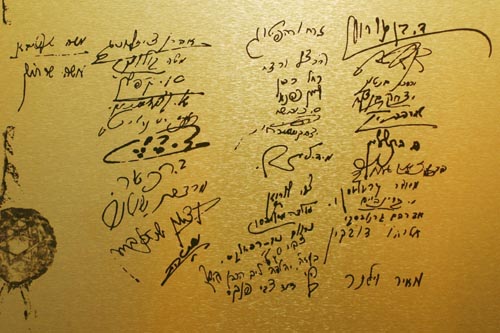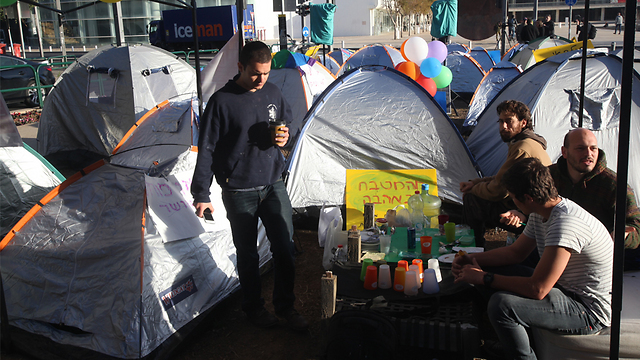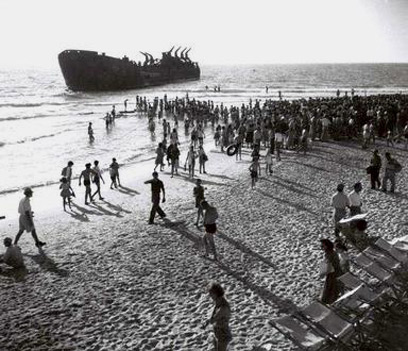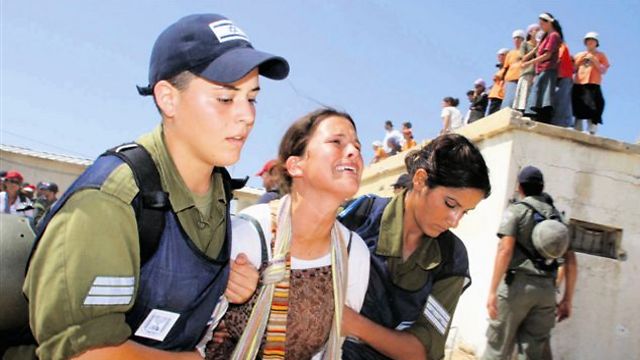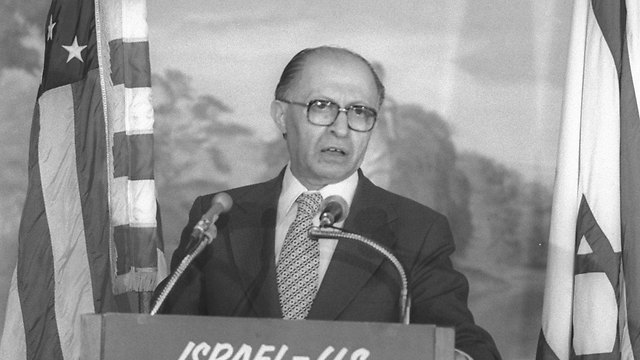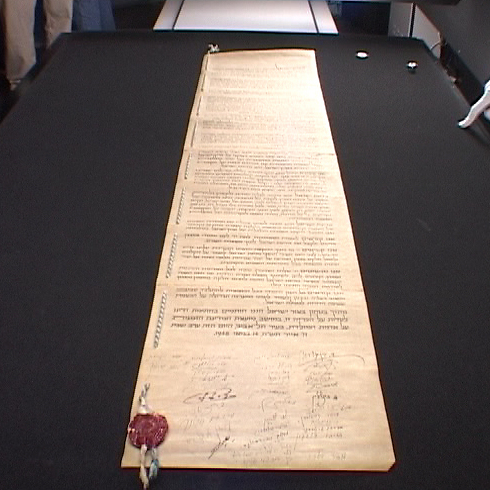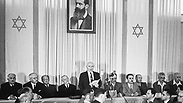
Which events most impacted Israeli democracy?
Joint poll by Ynet and the Israel Democracy Institute explores the top 10 events during Israel's 68 years of independence, including Rabin's assassination, the Gaza disengagement and the Six Day War.
Israelis consider the day Israel declared its independence as the event that had the strongest impact on Israeli democracy, according to a poll conducted by Ynet and the Israel Democracy Institute (IDI) in honor of Israel’s 68th Independence Day.
The poll, conducted on Ynet's Hebrew website, enumerated 25 significant events that took place throughout Israel’s history. Readers were asked to choose five events they felt had the strongest influence on Israeli democracy. More than 10,000 readers responded.
The results: 60 percent see Israel's declaration of independence as having the most impact on Israeli democracy. Not surprisingly, the assassination of Prime Minister Yitzhak Rabin came in second (55 percent of voters). In third place (46 percent of voters), was the elections upset of 1977, when the right-wing Likud party under Menachem Begin defeated Mapai to become the ruling party for the first time after 29 years of left-wing rule.
The 1967 Six Day War and the subsequent settlement enterprise in the territories captured in the war took fourth place, at 43 percent. Fifth place, 30 percent of voters, went to the prosecution of President Moshe Katsav and Prime Minister Ehud Olmert, who, despite their senior state roles, stood trial like any other citizen. This proved that that no person deserving of punishment, not even a former president or prime minister, is immune – all are equal before the law.
Here are the 10 events that Ynet's readers chose as having had the strongest influence on our democracy.
10th place: The Kol Ha'am High Court Ruling (17%)
It was fairly surprising that even though the incident took place in the 1950s, it managed to squeeze into 10th place, bumping quite a few other significant events off the list. The Kol Ha'am High Court ruling was the first to probe the boundaries of the freedom of expression when they clashed with national security.
It started with a controversial article against the government that was published in the Kol Ha'am newspaper, the mouthpiece Israel’s Communist Party.
Interior Minister Israel Rokach, using his authority under the Press Ordinance, suspended Kol Ha'am and its Arabic-language sister newspaper Al-Ittihad for 10 days.
The newspaper appealed to the High Court of Justice, which overturned Rokach’s decision. The High Court’s ruling, which became a milestone and a formative event in Israeli constitutional law, laid out the manner in which civil rights and freedom of expression could be protected when they clashed with other values.
9th place: The 2011 social justice protest (18%)
Although this event took place just five years ago, and should therefore still be fresh in the nation's collective memory, it seems Israelis barely see it as having impacted Israeli democracy.
The social justice protest, which began on Facebook in the summer of 2011, focused on Israel's high cost of living in general, and the shortage of affordable housing in particular, and led to the erection of a tent city on Rothschild Boulevard in Tel Aviv, among other places.
The government’s response was to set up the Trajtenberg Committee, which examined the problem and suggested solutions for the demonstrators’ economic demands, principally for the high cost of living and social inequalities in the State of Israel.
Some see the protest as a turning point in the public’s mood: from a protracted period of apathy and escapism to a stronger belief in the ability of rank-and-file citizens to make change, increase their political participation and awareness, and demand that elected officials act according to the democratic values of transparency and accountability.
8th place: The Basic Laws of 1992 and the 'Constitutional Revolution' (24%)
The Knesset passed two Basic Laws in 1992 that, for the first time, dealt with individual rights. Three years later, the High Court of Justice ruled in the Mizrahi Bank case that the status of the Basic Laws was superior to that of ordinary laws. So it was determined – on the basis of interpretation – that the court had the authority to decide on the constitutionality of the Knesset’s laws.
This event, which became known as the “Constitutional Revolution,” paved the way for the court’s judicial review of the Knesset’s laws, and found expression in the court’s judicial activism vis-à-vis the other branches of government.
The decision has been the subject of a public debate between those who claim that a strong court is vital to the protection of democracy and civil liberties and those who believe that the court took on powers that do not belong to it, compromised the Knesset’s ability to govern, and does not represent the spectrum of views in Israeli society.
7th place: Altalena Affair and the Dissolution of the Palmah (25%)
Since the Altalena Affair is one of the most deeply etched events in the State of Israel’s history, it is not surprising that it was included among the top 10.
One of the major challenges during the state’s early days was to merge the underground militias that had operated during the period of the British Mandate into a single national army, the Israel Defense Forces (IDF). This challenge, with all its complexity, reached a violent climax in June 1948 with the Altalena Affair, when the newly-formed Israeli army and fighters of the Irgun clashed violently over the unloading of the weapons carried on board the cargo vessel Altalena. Sixteen Irgun fighters and three IDF troops were killed in the incident.
That same year, Prime Minister David Ben-Gurion ordered the dissolution of the Palmah and the merging of its brigades into the Israeli army. During the process of dissolving the underground militias, Ben-Gurion came under harsh political criticism for using excessive force and acting out of ulterior political motives. Still, many people felt that these measures were vital for establishing the sovereignty of the nascent state.
6th place: The Gaza Disengagement (28%)
The disengagement from Gaza was undoubtedly one of the most painful events in Israel’s history.
The disengagement, a political plan put forward by Prime Minister Ariel Sharon, called for the removal of the Israeli communities from the Gaza Strip and northern Samaria, unilaterally and without negotiations with the Palestinian Authority.
In the days leading up to the disengagement, a referendum was held among registered Likud members, who voted against carrying it out. Regardless, Prime Minister Ariel Sharon brought the disengagement plan to the cabinet for approval, dismissing two right-wing ministers in order to ensure a majority.
The disengagement took place between August and September 2005 after a tumultuous political struggle. Even though the public protest of the plan was accompanied by fears of a civil war and incidents of civil disobedience among members of the religious Zionist movement, the plan was carried out with no severe violent incidents.
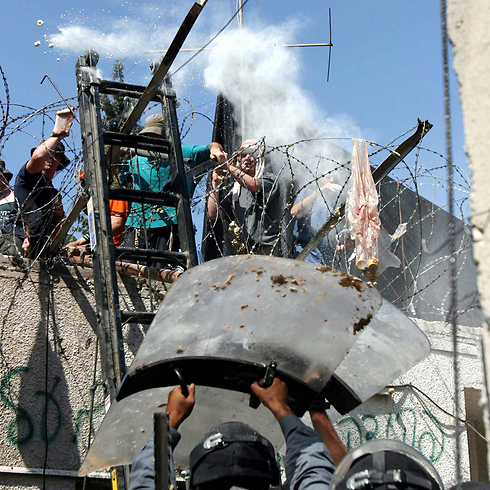
The plan’s implementation, together with the internal protest in the Likud, led to the resignation of Sharon. A group of Likud ministers and Knesset members ultimately established the Kadima political party.
5th place: Former prime minister and president get jail sentences (30%)
The rule of law is an essential element of a liberal democracy. One of its main tests is its equal treatment of rank-and-file citizens, elected officials, and members of the elite.
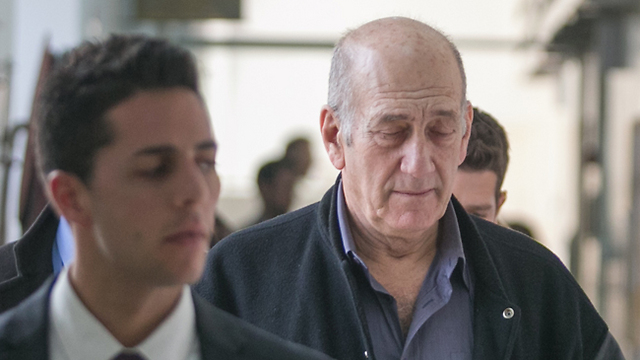
The current state of affairs, in which a former president and a former prime minister are serving prison sentences, can be seen as proof of the strength of the institutions of the rule of law and the law enforcement authorities’ equal, unbiased treatment of people suspected of criminal acts.
4th place: 1967 Six Day War and the Settlement Enterprise (43%)
Some among us still remember the announcement: “The Temple Mount is in our hands!” Younger people heard about it from their parents, but the Six Day War will always be remembered as one of the most significant events in the history of the State of Israel.
During the Six Day War, which took place in early June 1967, the State of Israel conquered territory that tripled its size. Though Israel later ceded the vast majority of that territory as part of its peace agreement with Egypt, the war changed the contours of Israeli politics and opened an ideological rift that has been at its core ever since.
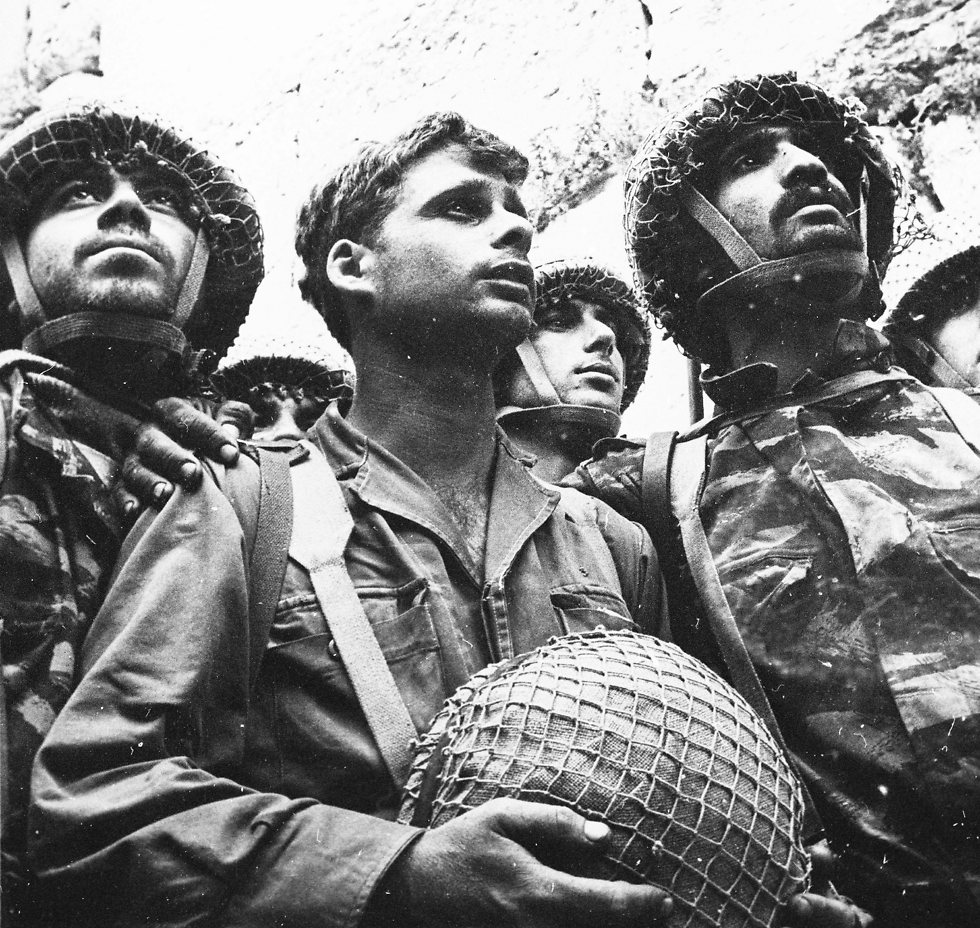
Today, advocates of "Greater Israel" see continued control of the territories in the West Bank, known also as Judea and Samaria, and the strengthening of Jewish settlement there, as an expression of the Jewish people’s historical right to the Land of Israel and also as a vital security necessity.
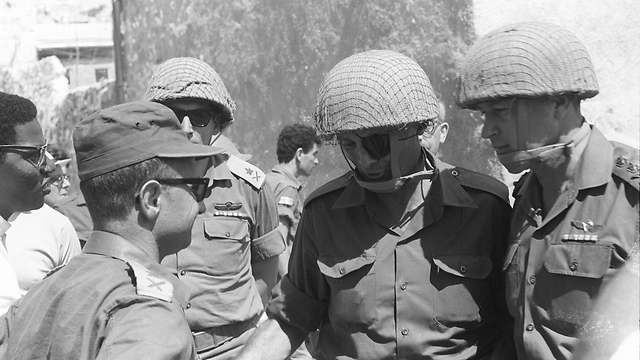
Those who favor withdrawal from these territories believe territorial compromise is a prerequisite for peace and that perpetuation of the current situation, in which residents of the same area do not enjoy equal rights, casts a heavy cloud over Israel's democratic future.
3rd place: The 1977 Elections Upset (45%)
Haim Yavin coined one of the Hebrew words that today is strongly identified with Israeli elections: "mahapach" - meaning, an elections upset.
After Mapai (and its successors, Labor and the Labor Alignment) spent nearly three decades as the ruling party, it was defeated for the first time in 1977 by the Likud, led by Menachem Begin.
This was a significant test for Israeli democracy that, it may be said, met it well. Despite the astonishment and shock among some segments of the public, the voters’ will was honored, and the transfer of power took place in proper fashion.
Begin proved to be nothing like the image of the threatening tyrant with which he had been associated. In addition, talks with Egyptian President Anwar Sadat began shortly after the elections, leading to the Camp David Accords and peace with Egypt, the first Arab country to sign a peace treaty with Israel.
2nd place: Rabin's assassination (55%)
The peace talks with the Palestinians, the approval of the Oslo Accords in the Knesset and the wave of suicide attacks in 1994 and 1995 led to severe polarization between the right and left wings.
Charging that the government’s policy was responsible for the attacks and put the State of Israel in danger, the political right wing ran a public campaign claiming that the government was illegitimate. Prime Minister Yitzhak Rabin was labeled a traitor by some protestors.
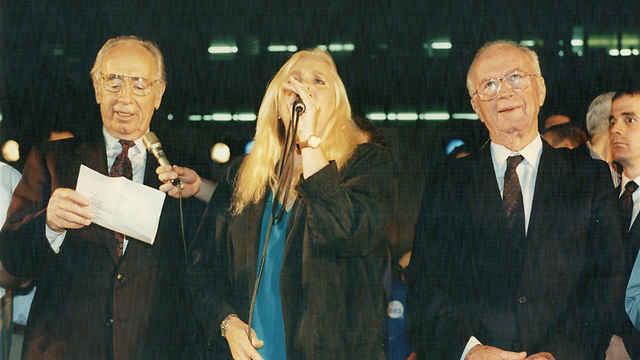
The campaign of incitement and divisiveness against him reached a climax in the autumn of 1995 after the signing of the Oslo II Accords. Rabin was assassinated by Yigal Amir on November 4 at the end of a peace rally at Malchei Yisrael Square.
1st place: The Declaration of Independence (60%)
On Friday, May 14, 1948, the members of Moetzet Ha'am, or the People’s Council, held a festive meeting in Tel Aviv during which the establishment of the State of Israel was announced.
The Declaration of Independence, which was signed by the 37 members of the People’s Council, is the foundational document of the State of Israel and its moral, national-cultural and democratic guiding light. It set forth, for the world and for Israel’s citizens, the justification for the State of Israel’s existence: as the setting in which the Jewish people would realize their right to self-determination.
At the same time, the declaration also expresses Israel’s democratic nature by setting forth principles of equality and justice for all its citizens. Many people, particularly during times of polarization, division, and weakened social solidarity, see the declaration as the basic “glue” that holds Israeli society together and as a document that provides Israel’s citizens with a broad common denominator.
"Israel's democracy is tested almost every day," IDI President Yohanan Plesner said. "Sixty-eight years of continued struggle for our very existence has required nerves of steel. But it has also clarified just how much we need a democracy that is strong, stable and prosperous. A democracy in which truth, morality and justice overcome terror, hatred, incitement, violence and racism. One that enables a variety of voices to be heard, including views that are provocative or controversial."
He went on to say that "At IDI, our goal is to preserve and strengthen Israel's democratic values. In this unique project, together with Ynet, we showcase events that shaped and challenged Israeli democracy. As this historical overview illustrates, Israel has overcome tremendous challenges and sustained a vibrant and essential democracy against all odds. I believe that together we can perpetuate this success story long into the future as well."










